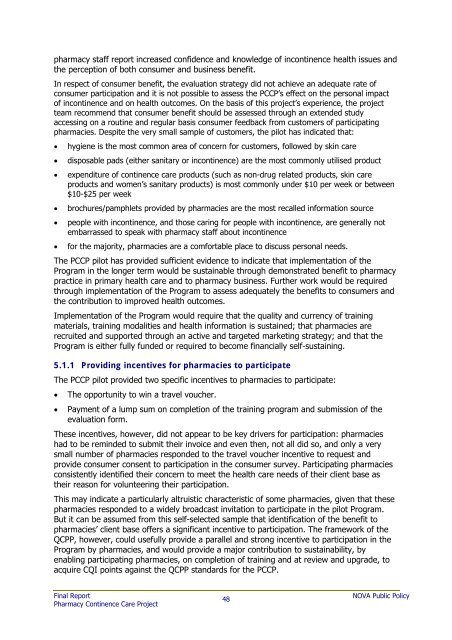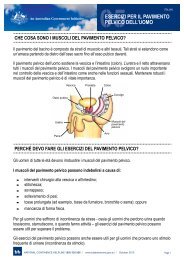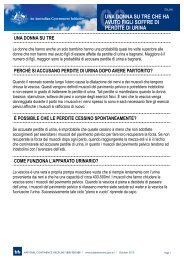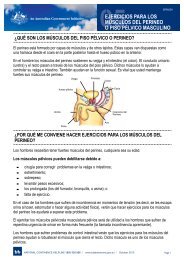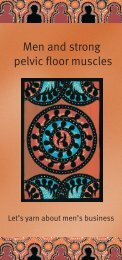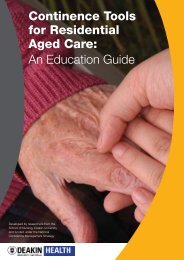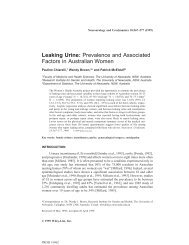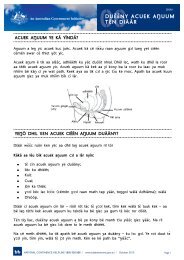Pharmacy Continence Care - Bladder and Bowel Website
Pharmacy Continence Care - Bladder and Bowel Website
Pharmacy Continence Care - Bladder and Bowel Website
You also want an ePaper? Increase the reach of your titles
YUMPU automatically turns print PDFs into web optimized ePapers that Google loves.
pharmacy staff report increased confidence <strong>and</strong> knowledge of incontinence health issues <strong>and</strong><br />
the perception of both consumer <strong>and</strong> business benefit.<br />
In respect of consumer benefit, the evaluation strategy did not achieve an adequate rate of<br />
consumer participation <strong>and</strong> it is not possible to assess the PCCP’s effect on the personal impact<br />
of incontinence <strong>and</strong> on health outcomes. On the basis of this project’s experience, the project<br />
team recommend that consumer benefit should be assessed through an extended study<br />
accessing on a routine <strong>and</strong> regular basis consumer feedback from customers of participating<br />
pharmacies. Despite the very small sample of customers, the pilot has indicated that:<br />
• hygiene is the most common area of concern for customers, followed by skin care<br />
• disposable pads (either sanitary or incontinence) are the most commonly utilised product<br />
• expenditure of continence care products (such as non-drug related products, skin care<br />
products <strong>and</strong> women’s sanitary products) is most commonly under $10 per week or between<br />
$10-$25 per week<br />
• brochures/pamphlets provided by pharmacies are the most recalled information source<br />
• people with incontinence, <strong>and</strong> those caring for people with incontinence, are generally not<br />
embarrassed to speak with pharmacy staff about incontinence<br />
• for the majority, pharmacies are a comfortable place to discuss personal needs.<br />
The PCCP pilot has provided sufficient evidence to indicate that implementation of the<br />
Program in the longer term would be sustainable through demonstrated benefit to pharmacy<br />
practice in primary health care <strong>and</strong> to pharmacy business. Further work would be required<br />
through implementation of the Program to assess adequately the benefits to consumers <strong>and</strong><br />
the contribution to improved health outcomes.<br />
Implementation of the Program would require that the quality <strong>and</strong> currency of training<br />
materials, training modalities <strong>and</strong> health information is sustained; that pharmacies are<br />
recruited <strong>and</strong> supported through an active <strong>and</strong> targeted marketing strategy; <strong>and</strong> that the<br />
Program is either fully funded or required to become financially self-sustaining.<br />
5.1.1 Providing incentives for pharmacies to participate<br />
The PCCP pilot provided two specific incentives to pharmacies to participate:<br />
• The opportunity to win a travel voucher.<br />
• Payment of a lump sum on completion of the training program <strong>and</strong> submission of the<br />
evaluation form.<br />
These incentives, however, did not appear to be key drivers for participation: pharmacies<br />
had to be reminded to submit their invoice <strong>and</strong> even then, not all did so, <strong>and</strong> only a very<br />
small number of pharmacies responded to the travel voucher incentive to request <strong>and</strong><br />
provide consumer consent to participation in the consumer survey. Participating pharmacies<br />
consistently identified their concern to meet the health care needs of their client base as<br />
their reason for volunteering their participation.<br />
This may indicate a particularly altruistic characteristic of some pharmacies, given that these<br />
pharmacies responded to a widely broadcast invitation to participate in the pilot Program.<br />
But it can be assumed from this self-selected sample that identification of the benefit to<br />
pharmacies’ client base offers a significant incentive to participation. The framework of the<br />
QCPP, however, could usefully provide a parallel <strong>and</strong> strong incentive to participation in the<br />
Program by pharmacies, <strong>and</strong> would provide a major contribution to sustainability, by<br />
enabling participating pharmacies, on completion of training <strong>and</strong> at review <strong>and</strong> upgrade, to<br />
acquire CQI points against the QCPP st<strong>and</strong>ards for the PCCP.<br />
Final Report<br />
48<br />
NOVA Public Policy<br />
<strong>Pharmacy</strong> <strong>Continence</strong> <strong>Care</strong> Project


